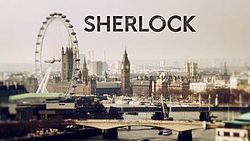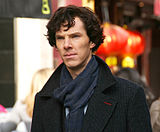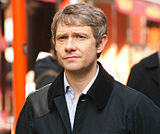 I’ve just been introduced to the British television series Sherlock. Netflix estimated a ranking of 5 out of 5 stars for me. I think the only time that happened before was based upon an Akira Kurosawa film, and of course, it was right. So last week, I sat down and watched the first episode. It was good so I watched the second tonight. Based upon them, I wouldn’t give it that high a rating, but it is very good. What the producers have done is modernize the characters. This is brilliant because there is a very big problem with the old stories: Sherlock Holmes is a very unlikable character. It is Watson we like. Watson’s whole Victroian era “I was in the Anglo-Afghan War” thing probably made him very cool to readers at the turn on the 19th century. But for the modern reader (or viewer), he seems very stodgy. So naturally we gravitate toward Holmes, only to find that he really is an asshole.
I’ve just been introduced to the British television series Sherlock. Netflix estimated a ranking of 5 out of 5 stars for me. I think the only time that happened before was based upon an Akira Kurosawa film, and of course, it was right. So last week, I sat down and watched the first episode. It was good so I watched the second tonight. Based upon them, I wouldn’t give it that high a rating, but it is very good. What the producers have done is modernize the characters. This is brilliant because there is a very big problem with the old stories: Sherlock Holmes is a very unlikable character. It is Watson we like. Watson’s whole Victroian era “I was in the Anglo-Afghan War” thing probably made him very cool to readers at the turn on the 19th century. But for the modern reader (or viewer), he seems very stodgy. So naturally we gravitate toward Holmes, only to find that he really is an asshole.
Sherlock fixes these problems by making Watson a military doctor retired from the Afghanistan War, which is, you know, just perfect. And played by Martin Freeman, I think he is who most modern men wish they were: courageous, smart, and generally a decent guy. He provides the reality that the show needs. Without him, it is just another super hero action show. Or perhaps Monk without the humor.
 A similar transformation is accomplished with Sherlock Holmes. Modern depictions of that character have always struggled with him because of his drug use: cocaine and (almost never mentioned in modern tributes) morphine. They have either ignored it, psychologized him, or turned him into some kind of self-destructive madman. There are basically two valid ways to read the character. Either he is just bored or it is a character flaw. Both are pretty much the same. He is a man who has an overactive mind and he simply needs to change it. Regardless, Doyle was right to understand that someone as brilliant as Holmes would certainly have aspects to his personality that most people wouldn’t like. (I wrote about this in the modern world, recently.) Sherlock does not shy away from Holmes’ antisocial tendencies, without turning him into Robert Downey Jr.
A similar transformation is accomplished with Sherlock Holmes. Modern depictions of that character have always struggled with him because of his drug use: cocaine and (almost never mentioned in modern tributes) morphine. They have either ignored it, psychologized him, or turned him into some kind of self-destructive madman. There are basically two valid ways to read the character. Either he is just bored or it is a character flaw. Both are pretty much the same. He is a man who has an overactive mind and he simply needs to change it. Regardless, Doyle was right to understand that someone as brilliant as Holmes would certainly have aspects to his personality that most people wouldn’t like. (I wrote about this in the modern world, recently.) Sherlock does not shy away from Holmes’ antisocial tendencies, without turning him into Robert Downey Jr.
In the first episode, “A Study in Pink” (which is quite similar to A Study in Scarlet), we are introduced to two important characters. First, there is Holmes’ brother Mycroft. I suspect that the writers expected his revelation to be a surprise, since he is made out to seem like Moriarty. Anyone who knows the original, however, would not have been fooled. He is not an important character in the books, but he is ever so much fun. Sherlock seems downright normal compared to his brother. Just the same, the original character is clearly changed in Sherlock.
 The other character is Moriarty, who, though only mentioned, apparently set up the villain in the first episode. I don’t much like the character. For one thing, he hardly exists in the original stories. The very idea of a criminal mastermind soils the whole thing. And then to give the character an Irish name adds racism on top of that. It is only since Doyle’s death that other writers have taken it upon themselves to turn Moriarty into a major character. I guess Sherlock wouldn’t be complete without him, but it does tire me.
The other character is Moriarty, who, though only mentioned, apparently set up the villain in the first episode. I don’t much like the character. For one thing, he hardly exists in the original stories. The very idea of a criminal mastermind soils the whole thing. And then to give the character an Irish name adds racism on top of that. It is only since Doyle’s death that other writers have taken it upon themselves to turn Moriarty into a major character. I guess Sherlock wouldn’t be complete without him, but it does tire me.
In the second episode “The Blind Banker,” we get to see a graffiti artist Raz, who I think is supposed to be part of the Baker Street Irregulars. In the first episode is Inspector Lestrade, similarly modernized. Half the fun of the series is seeing what they will do with the characters and the plots (which at least thus far hearken back to original stories). For someone like me, it is perfect, because it takes away what has always bothered me with the stories. The series is effectively what Arthur Conan Doyle would be producing if he were alive today.
I’m not saying the series is great. It’s hard to say after seeing only two episodes. It also has lots of modern Steven Soderbergh like editing as well as digital images floating across the screen. None of that is necessary, I think. In fact, I find it kind of annoying. And I’m not too fond of the ticking bomb endings. But it is still quite good—better than almost all of the television that I manage to see. And it is sure to please anyone who likes the original.






I believe the actor who plays Mycroft is also one of the show’s head writers, so it was probably fun to write himself a part like that.
Some of the stories bend plausibility a bit (the worst might be the second season’s "Hound Of The Baskervilles") but the two leads are just so perfect it doesn’t matter. And I ended up getting accustomed to over-the-top Moriarty (who at least isn’t Irish in the show); not ever enjoying him, but accustomed to him.
The best episodes are just wonderful. And what work went into them! They’re mini-movies, with faith in the basic intelligence of the audience. The running gag that everyone assumes Holmes and Watson are gay is priceless. Watson is rather apologetic about it; Holmes is just annoyed anyone could think him conventionally boring enough to have sexual interest in anyone . . .
The new ones should be ready early next year. Best of all, the first two seasons aired on PBS, so I’ll bet the next one will too.
FYI – new episodes of Sherlock are coming this month on PBS. Check your listings.